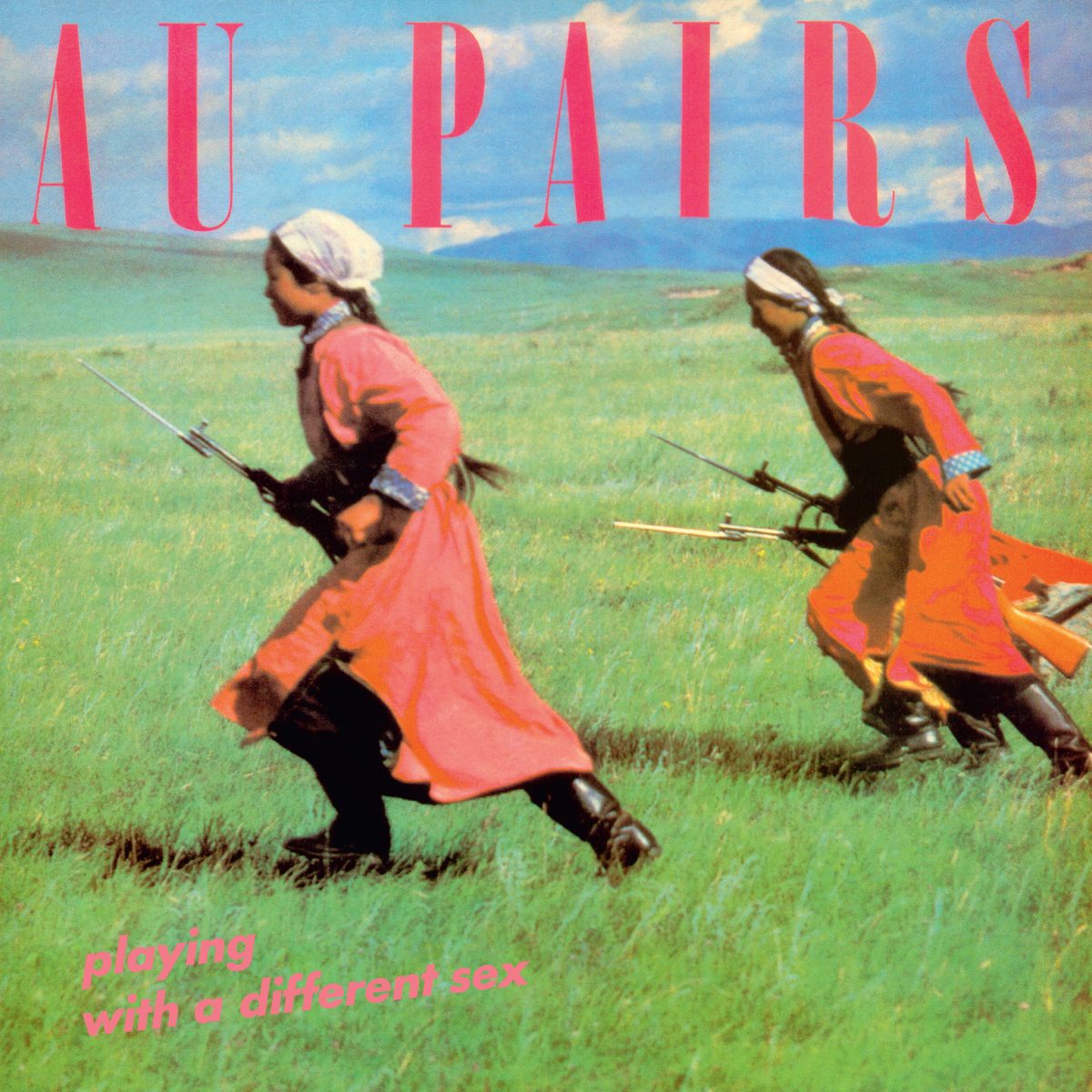The two LPs by seminal early-80s post-punk band Au Pairs are being reissued on vinyl.
Pete Harvey spoke to singer, guitarist, song-writer Lesley Woods for Louder Than War
The first Au Pairs album Playing with a Different Sex (1981), reflects the times it was created in. After two years of Thatcher’s government, Britain was in the grip of social and political turmoil, marked by deep divisions over race, class, and identity. With industrial action, police brutality, conflict in the North of Ireland and the highest unemployment in fifty years, the country grappled with rampant racism, widespread gender inequality, and a culture of intolerance, particularly towards LGBTQ+ individuals.
Playing with a Different Sex (PWADS) dealt head on with the issues of the day, not least of which was the maltreatment of female political prisoners in Armagh. The record sounds as fresh and confrontational today as it did then. The percussive rush of Jane Munro (bass) and Pete Hammond (drums) supports the cutting, slashing dual guitar attack of Paul Foad and Lesley Woods. Woods’ sprechstimme vocal delivers a payload of ideology, criticism, passion and pain. I think this one of the strongest debut albums of the post punk era.

The opening track ‘We’re so cool’ deals with the difficulties of negotiating an open relationship. The song sets out the Au Pairs stall perfectly; it is thematically challenging and laden with imaginative hooks and mantra-like wordplay. Each successive song continues the discourse and explores the outer limits of pop music.
I asked Lesley whether The Au Pairs were formed specifically to deliver a socio-political message?
“I wanted to get up and play music, I wanted to be in a band. But then I didn’t want to sing the boy meets girl pop songs of the day. This was like 40 years ago, there were no gay artists or at least none that were out. There were a lot of things to be angry about, there are a lot of things to be angry about now. There was apartheid there was abortion there were equal rights and a woman’s right to choose There was a lot of discrimination and all the anti-discrimination laws that we have now came into existence in the 1980s. Like the 1979 UK pay act, it’s one thing to have a law but it takes a long time for the law to seep through and practices that are endemic in workplaces to change.”
You can’t read a review of The Au Pairs without coming across the phrase ‘sexual politics’. You were one of the few bands directly addressing those issues. How do you think the songs fit in a modern context?
“I think one of the things that young people have to their advantage today is that it’s not unusual for them to live with parents that have very egalitarian relationships. There’s far less stereotypical role playing, where mum stays at home and cooks the dinner. Dads cook, dads wash, dads washup, dads play an equal part in running the household.
There’s not that division of labour. These kids grow up in those environments and when they go on to have relationships they have better role models. There’s less ‘my father was violent and used to beat my mum up and therefore I’ll beat my wife up’.”
That’s the theme of the Bowie cover ‘Repetition’, did David ever comment on your version?
“I don’t know, we certainly had to get his permission to do it and also to use the Eve Arnold photograph of Mongolian women doing military training on the cover.”
I read that the cover of (the second album) Sense and Sensuality was not approved by the band? “Where did you read that?” Wikipedia “Well, I don’t know where they got that from, it’s by Kandinsky and as far as I remember we all approved it. Martin Culverwell came up with the artistic ideas and he’d always ask us what we thought of things, single covers and so forth.

In contrast to the vital, concentrated, frenetic energy of the debut album the second album ‘Sense and Sensuality’ (1982) introduces a wider palette of instruments and in my opinion is a less successful record.
“I think there are some good tracks on it, like ‘Shakedown’,’
I read that the band had done two hundred gigs prior to getting into the studio the second time and you had lost your voice?
“Yes, my voice was shot. We had financial constraints and we were up against it. It would have been nice to have spent more time, to have had the luxury of spending more time. We were not in a very good place for one reason or t’other. We were ‘cast asunder’ from each other, we weren’t as tightly bonded. When I look at photographs of us in the PWADS days I can see we were so happy, we were so happy together. A relationship that at that point of time was really working well. When we got to the Sense and Sensuality (S&S) point there had been quite a few destructive influences that had got to us individually and we were not we were no longer tight together.”
If there was an Au Pairs ‘recipe’ on PWADS consisting of surprising tonality, twists of direction, stabbing guitars and astonishing percussion. It sounds like you were running out of ideas on S&S?
“I think that’s right. I was like what the fuck shall I write about now? and there was no-one to bounce ideas around with. A lot of those lyrics were penned in the studio on the fly. I’m not particularly proud of them they feel half-worked”
Had the sexual political songs become simply ‘sexual’?
“No, there are political songs on Sense and Sensuality”
In fact the last three songs on side two; ‘Stepping out of line’, ‘Shakedown’ and ‘America’ are just that, ranging from the refusal of gender stereotyping via Thatcher and Reagan to America’s violently paranoid foreign policy.
“Paranoia in America, I like that and I like the drums on that. It’s my plan to rewrite it, about Gaza and the Israeli tanks rolling in despite the ceasefire.”
American politics are centre stage once again with the Trump administration busily removing human rights from the constitution. I mentioned the US Supreme court overturning ‘Roe v. Wade’ (1973) and allowing individual states to regulate or ban abortion.
“What no-one seems to realise is that the Roe vs Wade ruling was part of a recognition of a woman’s right to privacy. Which is part of your human rights, your right to a private life. The judges said there’s no right to abortion in the American constitution and have ignored what Roe vs Wade actually said about an individual’s constitutional right to privacy.”
Lesley Woods is passionate and resolute in her role as a spokesperson for human rights. It is astounding that so many societal problems have remained unsolved for millennia. Lesley distils the basics of these problems into a single pithy phrase which encapsulates not just the humanitarian issues but the political stance of a talented and significant British band on the last track of ‘Playing with a Different Sex’.
“You’re equal but different, you’re equal but different, it’s obvious.”
Both LPs are available to order via Music on Vinyl
Playing with a Different Sex release date: 21 March 2025
Sense and Sensuality release date: 7 February 2025
Lesley Woods is on Facebook. She is supporting Gavin Friday at Earth Theatre, London on 6 April 2025 and gigging in May with Jerry Harrison & Adrian Belew: Remain In Light UK tour
Interview by Pete Harvey
Photo by Mick Geoghegan
We have a small favour to ask. Subscribe to Louder Than War and help keep the flame of independent music burning. Click the button below to see the extras you get!
Read full article at source
Stay informed about this story by subscribing to our regular Newsletter

